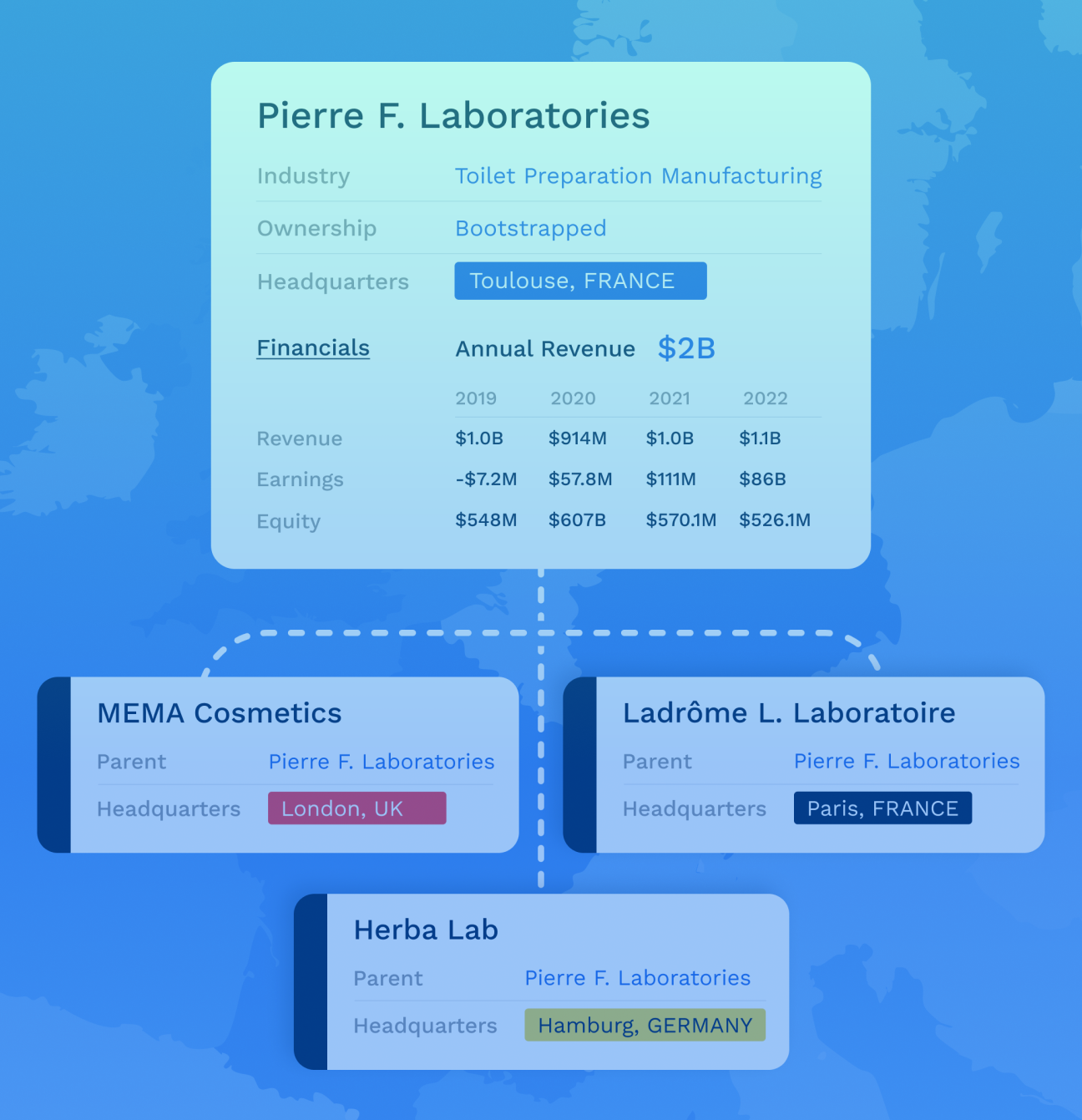Middle-market companies are some of the most important businesses in the economy.
These companies typically have annual revenues between $10M and $1B. Because of their size, these companies are often able to grow quickly, innovate, and adapt to changes in their industries.
In this article, we take a closer look at successful middle-market companies from industries including technology, healthcare, consumer products, and manufacturing. We dig into how these companies are making an impact, growing their businesses, and leading the way in their fields.
10 Successful Middle-Market Companies
The following companies are standout examples of middle-market businesses that have achieved remarkable success across diverse industries. Each one demonstrates how quality services, innovation, and strategic focus can drive growth and make a lasting impact within their respective sectors.
Middle Market Companies in Technology
Veeam Software

Ownership: Investor Backed
Revenue Estimate: $669M
Veeam Software is a Washington-based company that provides data management and backup solutions for businesses.
Veeam serves a wide range of customers, including enterprises, small to medium-sized businesses, and cloud service providers operating in complex and dynamic IT environments.
The company focuses on ensuring that its customers are data resilient, meaning that they have access to seamless, reliable, cloud-based backup and recovery solutions.
Veeam was ranked #1 Worldwide Market Share in Gartner’s 2024 Market Share Analysis, as well as Highest in Ability to Execute in Gartner's 2024 Magic Quadrant. Additionally, Veeam was named the top global provider in IDC’s Semiannual Software Tracker, H1’2024.
The company is backed by investors including Insight Partners, CPP Investments, and ABRT Venture Fund.
Syncfusion

Ownership: Bootstrapped
Revenue Estimate: $399M
North Carolina-based Syncfusion is a bootstrapped software company that offers a wide range of developer tools and enterprise solutions. Its products include UI control suites, embedded BI platforms, electronic signature software, and help desk software.
The company’s Essential Studio software package reportedly includes over 1,900 components and frameworks for platforms like WinForms, WPF, .NET Maui, JavaScript, and more.
Syncfusion primarily serves individual developers, small businesses, and large enterprises who require tools and platforms to accelerate software development, data analysis, and user experience optimization. Its pool of clients reportedly includes over 1M developers and 35k+ companies, including over 400 Fortune 500 companies.
Middle Market Companies in Healthcare
U.S. Renal Care

Ownership: Investor Backed
Revenue Estimate: $751M
U.S. Renal Care provides dialysis services for patients living with kidney disease and chronic kidney failure. The Texas-based company oversees 500+ dialysis centers and 200+ home programs across 32 states. It offers in-center hemodialysis, peritoneal dialysis, home therapies, and nutritional counseling.
U.S. Renal Care is focused on providing high-quality, deeply personalized care to its patients. The company works with nephrologists, clinicians, social workers, and renal dietitians to deliver care to over 36,000 people before, during, and after treatment.
The company is backed by investors including Bain Capital, Revelstoke Capital Partners, and Salix Ventures, among others.
Nursing Personnel Homecare

Ownership: Bootstrapped
Revenue Estimate: $812M
Nursing Personnel Homecare is a bootstrapped, New York-based company offering home healthcare services, including skilled nursing, physical therapy, occupational therapy, and personal care.
The company employs over 1,000 trained and certified home health aides, who provide transportation and companionship to doctors appointments, grocery shopping, social events, and more. They also provide light housekeeping services for patients.
Middle Market Companies in Consumer Products
Storck

Ownership: Bootstrapped
Revenue Estimate: $504M
Storck is a Germany-based confectionery company that sells a wide variety of candies, chocolates, and other sweets.
The company launched as a candy manufacturer in 1903. It is now one of the largest confectionery manufacturers in the world, and it remains a family-owned-and-managed business.
Storck supplies over 100 countries with its products.
Alltech

Ownership: Investor Backed
Revenue Estimate: $512M
Kentucky-headquartered Alltech aims to deliver sustainable solutions for the global agriculture industry. The company produces feed and biologicals for livestock using specialty ingredients and premix supplements. Its products are designed to improve the health and nutrition of animals and plants.
Alltech operates across five bioscience centers and 75 manufacturing facilities around the world. Its customer base spans across 140 countries.
Middle Market Companies in Manufacturing
Musim Mas Group

Ownership: Bootstrapped
Revenue Estimate: $921M
Musim Mas Group is one of the largest integrated palm oil manufacturers in the world. The company provides a wide range of palm oil products and derivatives — including crude palm oil, palm kernel oil, oleochemicals, biodiesel, and more — across multiple global industries.
Though Musim Mas Group’s main operations are headquartered in Indonesia, it has a footprint in 13 total countries.
Musim Mas Group strives to be a leader in sustainability and innovation. In 2021, the company became the first major oil palm group to be 100% certified by the Roundtable for Sustainable Palm Oil for its palm plantations with mills. It was also verified by the Palm Oil Innovation Group in 2019.
Rubix

Ownership: Investor Backed
Revenue Estimate: $449M
London-based Rubix is Europe’s largest supplier of industrial maintenance, repair, and overhaul (MRO) products and services. It serves customers across a wide range of industries, from chemicals to confectionery to automotive to pharmaceuticals.
The company is backed by Advent International.
Middle Market Companies in Professional Services
Grant Thornton

Ownership: Investor Backed
Revenue Estimate: $335M
Grant Thornton provides audit, tax, and advisory services to publicly traded companies, privately owned firms, government agencies, and not-for-profit organizations. Its clients operate across 15 industries, including real estate, retail, technology and telecommunications, banking, energy, healthcare, and more.
The company is backed by New Mountain Capital.
Glojeck & Steinberg Law Offices

Ownership: Bootstrapped
Revenue Estimate: $341M
Glojeck & Steinberg is a Wisconsin-based law firm that offers legal services including estate planning, probate law, personal injury, family law, business law, traffic matters, debt collection, and criminal defense.
The firm has been serving clients in southeast Wisconsin since 1937 and remains bootstrapped.
Top Industries for Middle-Market Companies
Middle-market companies play a major role in the economy, and some industries are especially good places for them to grow. These industries reward businesses that are quick to adapt, creative, and have expert knowledge. Let’s take a look at five industries where middle-market companies succeed and why.
Technology
The tech industry moves fast and changes all the time. That’s why it’s a great fit for middle-market companies. Unlike large tech corporations that may have slow decision-making processes, mid-sized tech firms can quickly adjust to trends like cloud computing, artificial intelligence (AI), or cybersecurity. Many focus on solving specific, smaller problems — such as building custom software or offering niche cybersecurity tools — that big companies might overlook.
One key advantage is their speed. For example, when generative AI became popular in 2023, many mid-market tech companies created AI-powered tools faster than big tech firms. Still, they face challenges like competing for skilled workers and growing their products quickly. Successful companies invest heavily in research, form strong partnerships, and stay focused on specialized areas to outperform both startups and large companies.
Healthcare
Healthcare is complex and always in demand, making it an ideal area for middle-market companies to grow. Mid-sized healthcare firms are flexible enough to find gaps in the market and deliver solutions fast. This might include telehealth services, new medical devices, or health IT platforms.
For instance, during the pandemic, many middle-market companies helped make telemedicine more available by building remote healthcare systems quickly, faster than big hospitals could. They are especially strong in areas like personalized care and using AI for diagnosis. However, challenges include strict government regulations and the high cost of developing products. Many of these companies stay successful by targeting niche markets or teaming up with larger companies to distribute their solutions.
Consumer Products
Consumer tastes change fast, and middle-market companies are well-equipped to keep up. In industries like food and beverage, fashion, and beauty, these firms can respond quickly to trends like sustainability, natural ingredients, or direct-to-consumer sales.
Modern consumers often prefer brands that feel real and support good causes. Many mid-sized brands found success early with plant-based foods or eco-friendly beauty products before big companies caught on. These businesses also build strong connections with their customers through social media, personalized service, and ethical practices.
One challenge is expanding production and getting products to more customers without losing the brand's unique identity. Successful mid-market brands handle this by partnering with contract manufacturers, making deals with retailers, and frequently launching fresh, creative products to stay ahead of larger competitors.
Manufacturing
Middle-market manufacturers are key drivers of new ideas in industry. They are large enough to invest in advanced technologies like automation, robotics, and AI-driven production without being slowed down by too much corporate red tape. This allows them to adopt new manufacturing methods faster, whether it’s bringing production back to the US, customizing products, or reacting to supply chain issues.
For example, during recent global supply chain disruptions, many US mid-sized manufacturers stepped up as quick, reliable domestic suppliers. They often specialize in making highly customized products like aerospace parts or electric vehicle components — markets where precision and flexibility matter.
Their main challenges are the high cost of equipment and finding skilled workers. But their ability to invest in new technology, train their workforce, and build close relationships with other businesses helps them stay competitive.
Professional Services
Professional services like consulting, accounting, legal advice, and marketing are also strong areas for middle-market firms. These companies succeed by offering personalized attention while still having enough size and resources to handle big projects. Large service providers can’t always offer custom solutions, and small firms may not have the scale. Mid-sized firms fit right in between.
They are big enough to provide a wide range of services but small enough to stay flexible. Many mid-sized consultancies, for example, lead the way in advising on hot topics like ESG (Environmental, Social, and Governance) strategies, digital transformation, or new regulations. They build close relationships with clients, offer expert knowledge, and adjust their services quickly to meet specific needs.
Their challenge is maintaining high quality and a strong company culture while growing. Many achieve this by focusing on what makes them unique — like deep knowledge in one area or offering flexible, creative solutions.
Comparison Table of Successful Middle-Market Companies

How Grata Can Help You Win the Middle Market
Grata is the leading platform for the private middle market. Dealmakers can use Grata to source targets, streamline their diligence workflows, and connect with other investors — all in one place.
With powerful, proprietary AI and investment-grade data, Grata makes finding and evaluating middle market companies easier than ever before. Schedule a demo to get started.
FAQs
What is considered a middle market company?
A middle market company typically generates annual revenues between $10M and $1B. These firms are larger than small businesses but not as large as major corporations.
How many mid-market companies are there in the US?
There are approximately 200,000 middle-market companies in the United States. Together, they represent about one-third of private sector GDP and employ around 48M people.
What is the difference between middle market and small business?
The primary difference is size, particularly in terms of revenue and number of employees. Small businesses typically earn less than $10M annually, while middle-market companies fall in the $10M to $1B revenue range.
What are mid-market retailers?
Mid-market retailers are retail businesses that are larger and more established than small local stores but not as massive as big-box or global retail chains. They often focus on specific customer segments, offering a balance between quality and price.
What is an example of a mid-market company?
Examples of mid-market companies include firms like Dutch Bros and Warby Parker. These companies have scaled operations nationwide but remain below the size of industry giants.
What makes a company mid-market?
A company is classified as mid-market based on factors like annual revenue, employee count, and market reach. Typically, mid-market companies earn between $10M and $1B in revenue and maintain a strong but focused presence in their industries.













